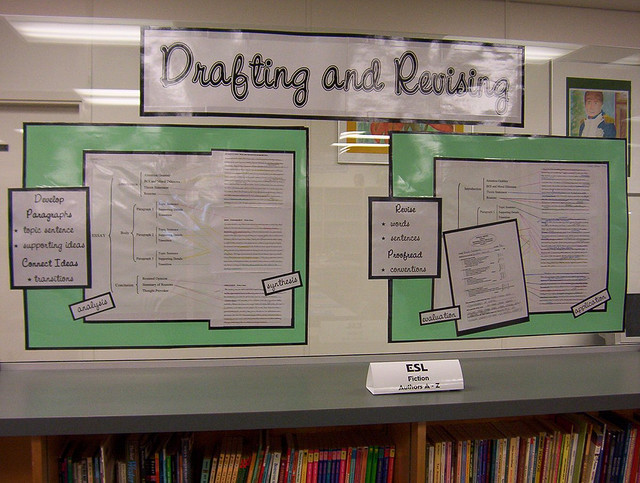How Do We Learn to Revise? (Teaching Revision Part 6)
This is a continuation of my posts on teaching revision. Earlier posts can be found here and here and here. If you’d like to contribute a guest post or response, please contact me at m [dot] salesses [at gmail etc.].
I remember a writer in my MFA program saying–in her workshop–that she never revised her writing. She thanked the class for their comments and then went on to say that she wasn’t going to incorporate any of the feedback, since she didn’t revise. At the time I wondered why she was in an MFA program, why she took workshops at all. But now I suspect that this isn’t such an uncommon way of thinking. That many students might go into workshops wanting to know whether (or to just be told that) their stories are good and hear a little about what to clean up to make them perfect. I would guess that for most writers, however, revision is a messy process that means rehauling and rethinking what one has written.
I’ll make a confession here: I have never revised a lit paper. In the class I am teaching right now I have a student who keeps calling her stories “papers.” I wonder if something about the attitude toward revision is academic–writing, for much of our lives, is grade-driven. But I have noticed that my daughter, who is five, will revise my stories and her own all the time. We have a game where we trade stories: first I tell one and then she tells one and so on and so forth. Sometimes this seems endless. Between the two of us, it is actually me, though, who does the least revision in our storytelling. When my daughter starts her stories, she often starts with the story I just told her and makes her changes to it. I’m usually the one who starts from scratch, or who thinks of it as starting from scratch.
For the past few months I have been reading Banana Yoshimoto books. This is a writer unafraid of cliche, of retelling the same kind of story over and over again. Yet her novels are compelling and moving and meaningful. Her books start with a young woman with deaths in her family, with the same kind of disaffected voice, add romance, add larger-than-life friends, add some element of mystery, and go. There are often–though this may be the translations?–phrases like “bursting with curiosity” and “I suddenly felt a surge of emotion” in the same paragraph (page 6 in the book I am reading right now). Sometimes these issues of “newness” seem the most likely candidates for discussion in a creative writing workshop, more likely than plot or arc or structure, things that require much more rewriting and rethinking, perhaps more conscious thought than subconscious.
Or is it only that we don’t teach students how to revise until they get to advanced creative writing courses (if at all)? I just finished teaching the revision course I’ve been writing about here, and my students almost cornered me into extending it. Many of them said they had never been taught how to revise.
It made me wonder how I learned to revise. I had a remarkable teacher, Margot Livesey, who gave a lot of time to her students (I’m often shocked to remember how much time). She offered to meet with us outside of class, and I took her up on this almost every week. I would send her my latest draft of whatever story I’d workshopped, and she would sit with me and go over the story line by line. Each time she would have the story marked up. She would ask me about various things I had done, and I would try to explain myself. She would talk about the rhythm and diction of various sentences, and make suggestions. I basically learned to revise by examining every little decision I made, first on a macro level (in workshop) and then on the level of the sentence. I learned how these things worked together through many discussions.
I’ve offered to meet with my students the same way, though no one ever takes me up on it. Of course I couldn’t do this with every student anyway. So I’ve tried to recreate the process in class. My students are supposed to revise their stories during or after each class and to write notes about the changes they made and why they made them. I’m unable to look over every draft of every student, but I can look over these notes and talk about them in class. Some of the prompts I’ve given are here and here. One of the things that I want writers to take from this is that revision is a constant practice of this kind of self-evaluation. For many students this might be the first time they realize just how constant and just how conscious.
I’ll continue this post next week, talking more about specific strategies and changes I’ve made to the workshop, building on some of the other posts on this blog in the past few months.
TO BE CONTINUED

